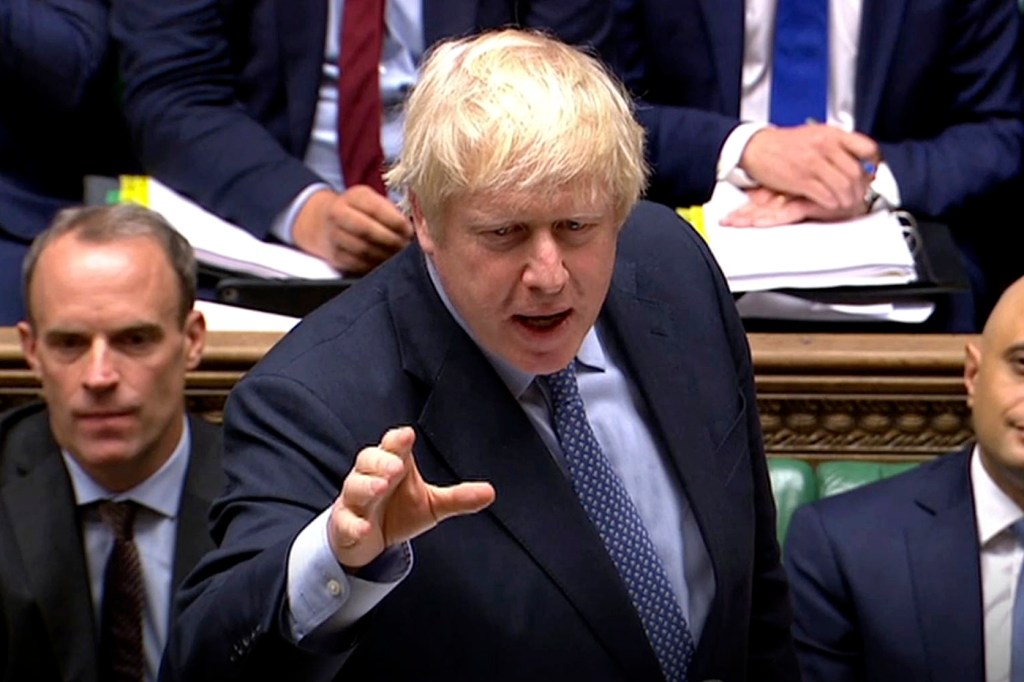Britain, Brexit, and Boris Johnson: How the UK is navigating its greatest constitutional crisis since World War II

LONDON—British politics is a mess. Tensions around the United Kingdom’s exit from the European Union has escalated to a drama of Shakespearean proportions this week.
First, Prime Minister Boris Johnson—a vehement proponent of Brexit who has vowed to take his country out of the EU on Oct. 31 no matter what—lost his razor-thin working majority in government.
Then, Johnson suffered a crushing defeat in a parliamentary vote that paves the way for lawmakers to block the U.K. from exiting the union if it has not struck a deal with its European counterparts.

Anthony Grayling is the founder and master of NCH at Northeastern in London. Photo by Suzanne Plunkett for Northeastern University
On Thursday, bowing to pressure, he abandoned attempts to block a law that would prevent a no-deal Brexit from happening.
“Without either question or hyperbole, this is the most important week in British politics since 1945,” author and philosopher Anthony Grayling, who is the founder and master of NCH at Northeastern in London, said Wednesday.
The developments on Parliament’s first week back after the summer recess have raised the prospects of the deeply divided country enduring a fresh general election or, indeed, a brand-new referendum that could take Brexit off the table completely.
Here are five things you need to know about Britain, Brexit, and Boris, and where we might go from here.
How did we end up in this mess?
On June 23, 2016, the U.K. held a nationwide referendum under Prime Minister David Cameron to determine whether the country would remain a member of the 28-state European Union, which allows free trade and movement of people. Around 17.4 million people, or roughly 52% of all voters, opted to leave, while 16.1 million, or 48%, chose to stay. The campaign was one of the most divisive in the modern history of the U.K., and was tarnished by fierce accusations of lying and unfounded claims on both sides.
The issue created a deep rift through communities and even families, and many who want to remain in the union accused those who cast their vote to leave of doing so because they weren’t educated enough about the possible consequences of the U.K. quitting the bloc.
Cameron resigned in the wake of the referendum. Theresa May was chosen to replace him. After months of negotiation, she eventually reached an agreement on the terms of the U.K.’s departure with her European counterparts, but her plan was based on initially accepting the union’s customs rules on goods and potentially limiting visa-free travel.
The plan attracted a massive backlash from both pro-Brexit and pro-EU lawmakers, opposition parties, and the Northern Irish Democratic Unionist Party, whose support she had relied upon to allow her minority government to function.
Eventually, after several failed attempts at getting support for her deal, May resigned on June 7. Boris Johnson, a former journalist, London mayor, and foreign secretary with a rich history of public gaffes, took over. He’s insisted that he will deliver Brexit, deal or no deal, and fiercely opposes a so-called Irish backstop, a sort of insurance policy to keep the Irish border open after the U.K. leaves the European Union. Johnson, though, has resisted calls for a backstop, calling the notion “anti-democratic.”
A no-deal Brexit could lead to economic mayhem
The prospect of a no-deal Brexit has incensed swaths of the country, and led to fierce protests both on the streets and in the halls of Westminster. It would mean that the U.K. crashes out of the single market and customs union, both of which are designed to facilitate trade between European Union members by doing away with tariffs and border checks.
It would immediately terminate the U.K.’s membership of dozens of organizations and bodies. Some commentators have predicted that the country, which is the world’s fifth-largest economy, would plunge into a recession and that the pound will crash.
“By the U.K. government’s own analyses, and by informed opinion from business, the transport industry, the health service, economists, and observers, a ‘no-deal Brexit’ would be extremely harmful to the U.K. economy and people, would have a serious effect on Ireland, a bad effect on the rest of the European Union, and would send negative ripples into the world economy,” said Grayling, whose upcoming book, The Good State: On the Principles of Democracy, places Britain’s dilemma in a global context.
One concern is that the departure could affect the availability of fresh produce, vital medication, and critical components for the country’s manufacturing sector.
Johnson’s premiership might be over before it properly started
Absolutely nothing is certain. On Tuesday, a group of opposition members of Parliament, backed by 21 rebels from Johnson’s own Conservative Party (including Winston Churchill’s grandson and two former finance ministers), defeated the government on a motion that would allow it to try to introduce a law to force an extension to the Brexit deadline.
On Thursday it emerged that Johnson’s own brother had quit the government in protest, reasoning that he had become torn between “family loyalty and the national interest,” and that this tension was “unresolvable.” Et tu, brother?
Johnson’s call for a general election was rejected by Parliament on Wednesday night, but the prospect of one is not entirely off the table. It would create what many agree to be three main options going forward. Johnson could garner enough votes to create a Brexit-supporting government; he could lose so much support that Jeremy Corbyn, the veteran socialist leader of the opposition Labour Party, would be able to create a government; or the country could be left with a hung Parliament, which could lead to a minority government or coalition of some kind.
Excluding caretaker leaders, George Canning was the shortest-serving prime minister in U.K. history, with a term of just 118 days before his death in 1827. Johnson must stay in office until November 20 to avoid breaking Canning’s unenviable record.
There’s still time for a deal with the EU
It’s also worth remembering that, although the Oct. 31 deadline is looming ever closer, there is a possibility that the U.K. strikes a deal with the European Union on the terms of a divorce.
On Thursday, Johnson’s government gave up trying to block a law aimed at stopping Brexit from happening without a deal. This could mean that the prime minister is required to ask the EU to extend the Brexit deadline, if he’s unable to reach a transition deal by the middle of October.
It’s not inconceivable that the deal thrashed out by May before her resignation could come back onto the table. But even though many EU officials have emphasized that a no-deal Brexit is in no one’s interest, there’s plenty of evidence that patience in Brussels is running thin.
And Grayling highlights that time is ticking. Asked about whether a deal might still be struck, he said: “Only if there is an extension to the Brexit deadline of sufficient length.”
…but Brexit still might not happen at all
A change of government would put every single option back on the table, including, of course, that Brexit doesn’t happen at all. That would require Article 50—the clause in the EU’s Lisbon Treaty that outlines the steps for a country seeking to leave the bloc voluntarily—to be revoked.
There could also be a second referendum. Grayling said the chances of that are improving, and that the chances of Brexit not happening at all are “good and increasingly so.”
But the country remains as divided as ever, and even though politicians of all persuasions have objected vocally to the prospect of no-deal Brexit, many are still in favor of the U.K. leaving the bloc, providing it’s done in a controlled way.
The future of Boris and Brexit couldn’t be less certain. Perhaps at this point even the kingdom’s future as a united one shouldn’t be taken for granted.
For media inquiries, please contact media@northeastern.edu.





